8 Entry-Level Data Analyst Jobs to Start Your Career

In this article
- What Does an Entry-Level Data Analyst Do?
- Is It Hard To Land an Entry-Level Data Analyst Job?
- 8 Entry-Level Data Analyst Jobs
- What Skills Do You Need To Land an Entry-Level Role as a Data Analyst?
- The Best Places To Find Entry-Level Data Analyst Jobs
- Tips To Land Your First Data Analyst Role
- FAQs About Landing an Entry-Level Data Analyst Job
Most people who want to join the field of data analytics and science, but haven’t started their careers yet, aren’t aware that the job title of “data analyst” actually encompasses many different roles. So if you’re interested in becoming a data scientist, then you’ll need to have an understanding of the data analyst landscape, particularly entry-level positions.
That’s why we’ve created this guide. Below, we’ll look at eight of the most common data analyst roles across industries. Keep reading to find out what kind of data analyst roles are out there and understand which one is right for you.
What Does an Entry-Level Data Analyst Do?
Entry-level data analysts work on small parts of larger data analysis projects. Their broad responsibilities are to collect and analyze complex datasets, and their eventual goal is to produce insights that can help their company make better strategic decisions.
Related Read: Entry Level Data Analyst Salary Guide: Who Makes What?
Is It Hard To Land an Entry-Level Data Analyst Job?
Not if you have the right qualifications. Companies are open to hiring candidates who’ve completed data analytics bootcamps, so you don’t necessarily need to invest in a college degree. Apart from that, you should work on creating a data analyst portfolio by working on your own real-world projects.
8 Entry-Level Data Analyst Jobs
Let’s now take a look at what different kinds of entry-level data analyst jobs entail. We’re going to break them down based on the technical skills, analytical skills, and communication skills that are expected of employees in each role.
Data Analyst Intern
What You’ll Do
Not every data analyst enters the industry via the intern route, but becoming an intern is perhaps the best way to cut your teeth as an analyst without having to shoulder the expectations of a full-time role. Data analyst interns are given basic tasks to gauge their analytical skills. This will usually be a small piece of a larger project. For example, you may be required to scrape a website for a particular kind of data or produce actionable insights from a small raw dataset.
Related Read: How to Land a Data Analyst Internship
Average Salary
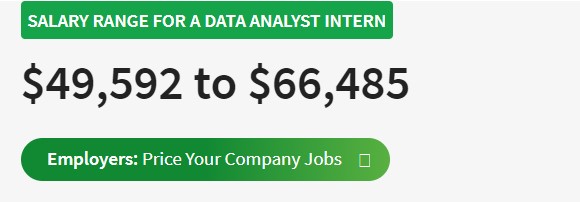
The average salary for data analyst interns in the United States is $56,633.

Basic Requirements for This Role
The requirements for the data analyst intern role are quite minimal. You’ll need to have a basic understanding of data analysis methods and techniques and know how to work with business data.
Junior Data Analyst
What You’ll Do
As a junior data analyst, you’ll get the opportunity to learn on the job and slowly begin contributing to bigger projects. This is one of the entry-level data analytics jobs where you can be given a whole host of different responsibilities based on the requirements of the company.
Junior data analysts usually work under more senior analysts who break down projects into manageable chunks. Junior analysts are then assigned small parts of the project based on their technical skills and analytical abilities.
Average Salary
The average salary for junior data analysts in the US is $61,398.

Basic Requirements for This Role
You need to have strong problem-solving skills to work as a junior data analyst. This is because you will be called on to solve some problems that you run into on your own. It also helps to have some presentation skills because analysts often make presentations to defend some of their decisions and findings.
Entry-Level Operations Analyst
What You’ll Do
As the name suggests, entry-level operations analysts work on the operations aspect of businesses. It will be your job to quantify the efficiency of different operational procedures and come up with propositions on how they can be enhanced.
The specific job description for this role will depend on the nature of the business that you’re working in. If you’re hired by an e-commerce company, then you might be tasked with studying warehouse and delivery operations. An entry-level operations analyst in a bank, on the other hand, will focus on aspects like customer acquisition or underwriting processes.
Average Salary
Entry-level operations analysts make $54,506 on average in the USA.
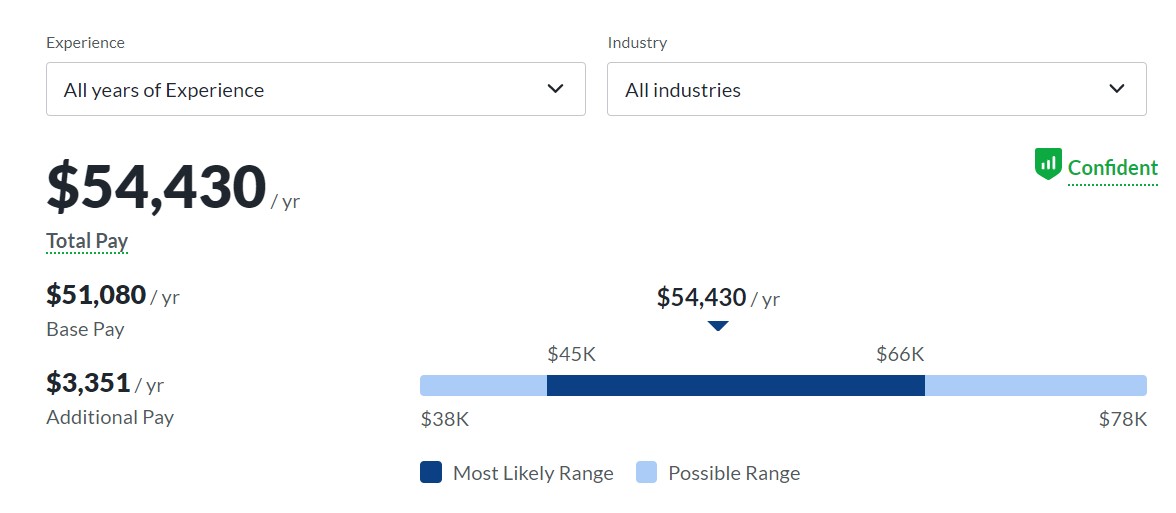
Basic Requirements for This Role
Operations analysts need to have a strong ability to study business processes. They must also be able to work with complex data sets, as their ultimate goal is to help make strategic business decisions using data-driven insights and critical thinking.
Get To Know Other Data Analytics Students
Bart Teeuwen
Global Business Analyst, Global Talent Intelligence (GTI) at Meta
Reagan Tatsch
Data Operations Manager at ISS
Jon Shepard
VP Of AI Research Strategy And Execution at J.P. Morgan
Junior Quantitative Analyst
What You’ll Do
Quantitative analysts are data analysts who have especially strong math and statistics skills. It will be your job as a junior quantitative analyst to crunch the numbers and come up with insights that can drive up business profits.
Quantitative analysts are usually hired in big numbers in the finance industry. Their main job there is to architect algorithms that can help venture capital firms, hedge funds, and investment banks, assess investment opportunities, quantify risk, and detect fraud.
Average Salary
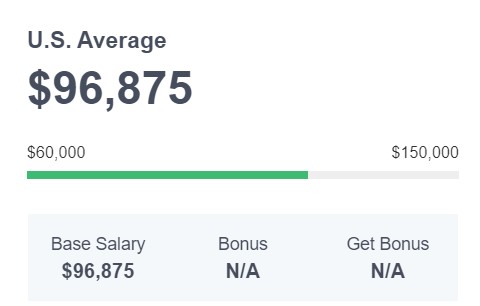

The average salary for junior quantitative analysts in the US is $96,875.
Basic Requirements for This Role
You’ve probably figured out by now that you need to be good with math and statistics to work as a quantitative analyst. It helps if you know how to use a tool like SAS or R, which analysts use for quant-heavy work.
Entry-Level Healthcare Data Analyst
What You’ll Do
Entry-level healthcare data analysts work in a few different capacities in the healthcare industry. You might find yourself in a core healthcare data analyst role where you assist with healthcare research. These kinds of roles are usually reserved for data analysts who come with some kind of healthcare background. Another way in which data analysts can work in healthcare is by using data to analyze the operations of hospitals and other institutions that provide healthcare services. Or you might also work with public health bodies to build data regulatory frameworks for these institutions and perform data analysis for these institutions.
Average Salary
The average salary of healthcare data analysts in the US is $70,345. Salaries for the role typically range from $59,000 to $80,000, so entry-level hires can expect to make closer to the lower end of that spectrum.

Basic Requirements for This Role
Healthcare data analysts usually work with very large volumes of data, so you should be comfortable working with voluminous datasets. When it comes to research, the data often tends to be visual in nature. It helps if you are a data analyst who knows image processing and image classification techniques.
Junior Financial Analyst
What You’ll Do
As a junior financial analyst, you will most likely find yourself working in a bank, hedge fund, or insurance company. With the rise of startups, venture capital firms have also started hiring financial analysts in large numbers.
Your job as a junior financial analyst will involve a lot of number crunching. You will need to have strong math skills so that you can work with quantitative data. You will also need to quickly bring yourself up to speed with foundational concepts in the financial sector for your job as a junior analyst.
Average Salary
Junior financial analysts make $68,109 per year on average in the US.

Basic Requirements for This Role
The main requirement for junior financial analysts is strong quantitative skills. Python is growing in popularity as a tool used to crunch financial data, and you may be required to pick up the language for your work.
Junior Business Intelligence Analyst
What You’ll Do
As a junior business intelligence analyst, you’ll contribute to projects analyzing market trends, products, and competitors. As a data professional, you will need to be good at mining business data from disparate sources and collating it for analysis. There will also be an emphasis on understanding your own company and the industry at large quickly.
Average Salary
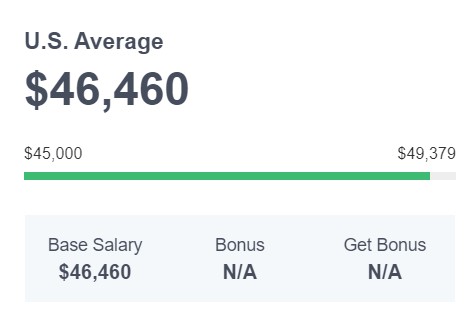

The average salary for junior business intelligence analysts is $46,460.
Basic Requirements For This Role
Junior business intelligence analyst roles usually require candidates to have basic skills in data analysis. You will need to know how to source data, build storage structures like data warehouses, and do basic analysis. Some companies might require you to learn a specific business intelligence tool like Domo or Rapid Insight.
Entry-Level Manufacturing Analyst
What You’ll Do
Entry-level manufacturing analysts gather data from manufacturing operations and analyze them to generate insights to guide business decisions. Manufacturing analysis is a unique role because it primarily involves tools that are more mechanical than digital. However, there are now sensors and other devices used to generate data insights on the performance of manufacturing tools. Your work will often involve studying this data as well as identifying other key data sources on the factory floor.
Average Salary
Manufacturing analyst salaries range from $67,500 to $120,000 in the USA. Entry-level hires can expect to make around the $70,000 mark.
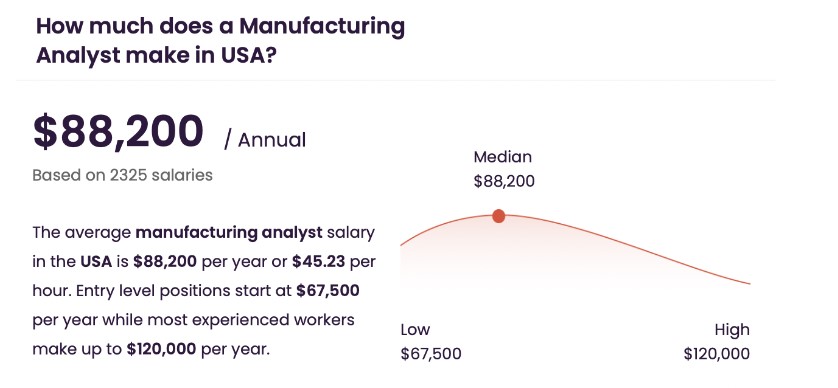
Basic Requirements for This Role
Manufacturing analysts should be willing to spend time learning about how factories function. You may be required to spend some time on the factory floor so that you gain some close-in experience. From there on in, your job will involve using basic data analytics tools and programming languages like Python and R to analyze the data available to you.
What Skills Do You Need To Land an Entry-Level Role as a Data Analyst?
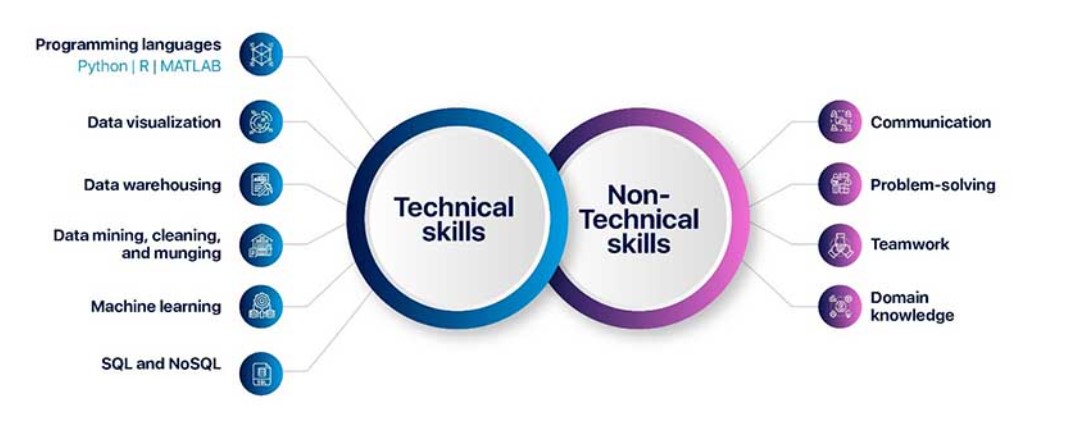
To land a job as an entry-level data analyst, you’ll need to possess the following combination of hard and soft skills:
Hard Skills
- Structured Query Language (SQL)
- Microsoft Excel
- Proficiency in Python and R
- Tableau
- Data visualization
Soft Skills
- Organization
- Attention To Detail
- Presentation
- Communication
- Problem-Solving
- Collaboration
- Analytical Mindset
The Best Places To Find Entry-Level Data Analyst Jobs
Here are a few ways that you can go about looking for entry-level data analyst job openings:
Job Boards
- Indeed
- ZipRecruiter
- AngelList
- Kaggle
- Aijobs.net
- Digital Analytics Association
Find a more exhaustive list of data analytics job boards here.
Networking

As a young data analyst, you should slowly build up a network that consists of other data analysts, recruiters in the industry, and tech industry veterans. LinkedIn is a great place to get started. All you need to do is look up data analysts, and you’re just a connection request away from getting to know someone better. Data science and analytics communities and events are also a great way to network with folks in the industry.
Related Read: Data Science Communities You Should Join
Marketplaces (Freelance or Project-Based Work)
Not every data analyst needs to work in a full-time office environment. You can choose to take the more flexible option and work as a freelancer. If you do decide to go down that route, there are plenty of marketplaces that hire talented data analysts.
Related Read: How To Become a Freelance Data Analyst
Tips To Land Your First Data Analyst Role
Here are five things you can do to help land your first data analyst role:
Pursue a Bachelor’s Degree (in a Related Field) or a Data Analytics Bootcamp
Having the appropriate educational background is a surefire way to get a recruiter’s attention when you’re applying for a data analytics job. If you want to go down the more conventional route, then a bachelor’s degree in computer science, software engineering, or math can help you land a data analyst job.
But that’s not the only option available to you. Data analytics bootcamps are more affordable and usually have students job-ready in a matter of months. Many bootcamps also offer a job guarantee or have career services offerings that can help you land a job quickly.
Build Relevant Experience by Pursuing Volunteer Work or an Internship
Having an existing body of work is perhaps the best way to stand out from other candidates applying to entry-level data analyst roles. There are a few ways you can go about building one.
Volunteering your time can be the easiest way to get your foot in the door at an organization. You can check in with non-profits and other institutions in your area to see if they require your skills as a data analyst and are willing to accommodate you in their team, even if it’s on a part-time basis.
Data analyst internships are also a great way to ease yourself into a career in data analytics.
Polish Your Resume
Your data analyst resume is how you create a first impression on recruiters. If your resume doesn’t make an impact, then you probably won’t have a chance to take the conversation further with companies that you’re interested in.
Build Your Network
Who you know matters just as much as what you know when it comes to landing a job. So remember to interact with as many data analysts, recruiters, and tech industry managers as you can both online and offline.
Find a Mentor
Not everyone has somebody more experienced looking out for them. If you manage to find a mentor, then you can find opportunities more easily and grow faster than you would have otherwise.
FAQs About Landing an Entry-Level Data Analyst Job
We’ve got the answers to your most frequently asked questions:
Can I Get a Data Analyst Job Without a Degree?
Yes, you definitely can! Companies nowadays hire candidates who’ve graduated from data analytics courses and bootcamps. You can also apply to entry-level data analyst roles using a portfolio of projects that you’ve worked on.
What Are the Qualifications To Become a Data Analyst?
You don’t need a qualification, like a specific degree or certification, to become a data analyst. Rather, you should focus on picking up the skills required for the job that you are applying for.
In general, data analysts should know how to process and analyze data; they should have a basic understanding of math and statistics. It also helps to know how to program in a language like Python or R.
Is Data Analytics a Stressful Job?
Data analytics is not a stressful job on its own. In fact, it can be quite a rewarding career for those who enjoy the job. But if you do feel like your workload is getting a bit much to handle, you can always have that conversation with your manager.
Does a Data Analyst Need To Code?
Not all data analysts code. Some work on mathematical analysis and others might use Microsoft Excel as their primary analytical tool. That said, it does help to know how to program because it is a skill that you might be called upon to use in your job as a data analyst.
Python, R, and Java are the programming languages you can choose from if you’re just starting out as a coder.
Since you’re here…
Considering a career in data analytics? We can get you there. Don’t take our word for it – check out our student reviews. After just 6 months of study in our fully flexible Data Analytics Bootcamp, we’ll boost you into a job in the field, guaranteed. Get started now with our free data analytics curriculum.





![What Does a Data Analyst Do [2022 Career Guide]](png/what-does-a-data-analyst-do-2022-career-guide-380x235.png)